Stephen Colbert's Late Show lets the Trump dossier defend itself from attacks by Trump, Fox News
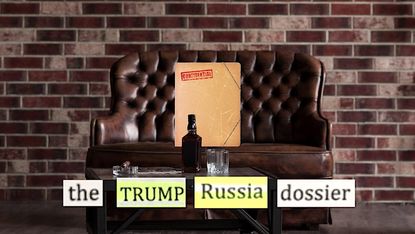

As Special Counsel Robert Mueller's investigation creeps closer to the White House, President Trump and his allies have increasingly been trying to delegitimize the entire investigation into Trump and his campaign's ties to Russia. One target, especially popular on the opinion side of Fox News, is the dossier compiled by former British intelligence agent Christopher Steele in 2016. Trump has called it fake, though the FBI and Mueller reportedly take its allegations seriously, and the president and his allies have latched onto the fact that much of Steele's research was indirectly paid for by Hillary Clinton's campaign and the Democratic National Committee.
On The Late Show, Stephen Colbert and his team let the Steele dossier offer a rebuttal, kind of, taking words from the dossier to needle Trump and push back on his criticism. "So what if Clinton and the Democratic Party provided funding for this report," the dossier says, in computer voice. "The data is relevant regardless of who sponsored it." It bolstered its point with an analogy about a husband caught frequenting prostitutes thanks to cameras paid for by Hillary Clinton. And yes, there's a nod to Colbert's favorite part of the dossier. Watch below. Peter Weber
Subscribe to The Week
Escape your echo chamber. Get the facts behind the news, plus analysis from multiple perspectives.

Sign up for The Week's Free Newsletters
From our morning news briefing to a weekly Good News Newsletter, get the best of The Week delivered directly to your inbox.
From our morning news briefing to a weekly Good News Newsletter, get the best of The Week delivered directly to your inbox.
Sign up for Today's Best Articles in your inbox
A free daily email with the biggest news stories of the day – and the best features from TheWeek.com
Peter has worked as a news and culture writer and editor at The Week since the site's launch in 2008. He covers politics, world affairs, religion and cultural currents. His journalism career began as a copy editor at a financial newswire and has included editorial positions at The New York Times Magazine, Facts on File, and Oregon State University.
-
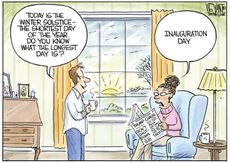 Today's political cartoons - December 22, 2024
Today's political cartoons - December 22, 2024Cartoons Sunday's cartoons - the long and short of it, trigger finger, and more
By The Week US Published
-
 5 hilariously spirited cartoons about the spirit of Christmas
5 hilariously spirited cartoons about the spirit of ChristmasCartoons Artists take on excuses, pardons, and more
By The Week US Published
-
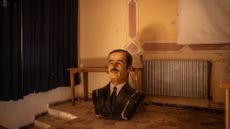 Inside the house of Assad
Inside the house of AssadThe Explainer Bashar al-Assad and his father, Hafez, ruled Syria for more than half a century but how did one family achieve and maintain power?
By The Week UK Published
-
 Honda and Nissan in merger talks
Honda and Nissan in merger talksSpeed Read The companies are currently Japan's second and third-biggest automakers, respectively
By Peter Weber, The Week US Published
-
 Taylor Swift wraps up record-shattering Eras tour
Taylor Swift wraps up record-shattering Eras tourSpeed Read The pop star finally ended her long-running tour in Vancouver, Canada
By Peter Weber, The Week US Published
-
 Drake claims illegal boosting, defamation
Drake claims illegal boosting, defamationSpeed Read The rapper accused Universal Music of boosting Kendrick Lamar's diss track and said UMG allowed him to be falsely accused of pedophilia
By Rafi Schwartz, The Week US Published
-
 'Wicked' and 'Gladiator II' ignite holiday box office
'Wicked' and 'Gladiator II' ignite holiday box officeSpeed Read The combination of the two movies revitalized a struggling box office
By Peter Weber, The Week US Published
-
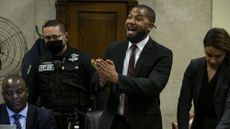 Jussie Smollet conviction overturned on appeal
Jussie Smollet conviction overturned on appealSpeed Read The Illinois Supreme Court overturned the actor's conviction on charges of staging a racist and homophobic attack against himself in 2019
By Peter Weber, The Week US Published
-
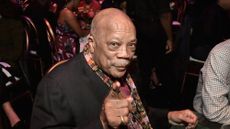 Quincy Jones, music icon, is dead at 91
Quincy Jones, music icon, is dead at 91Speed Read The legendary producer is perhaps best known as the architect behind Michael Jackson's 'Thriller'
By Peter Weber, The Week US Published
-
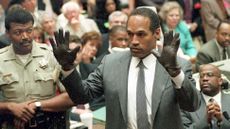 OJ Simpson, star athlete tried for murder, dead at 76
OJ Simpson, star athlete tried for murder, dead at 76Speed Read The former football hero and murder suspect lost his battle with cancer
By Rafi Schwartz, The Week US Published
-
 Momofuku's 'Chili Crunch' trademark uproar
Momofuku's 'Chili Crunch' trademark uproarSpeed Read The company's attempt to own the sole rights has prompted backlash
By Rafi Schwartz, The Week US Published